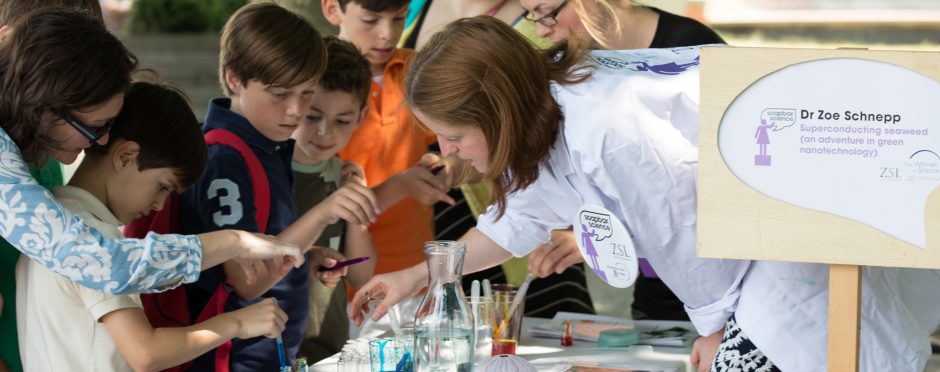 Jessie Durk is currently a PhD student at Queen Mary University London, researching theoretical cosmology. She is passionate about science communication, believing it is crucial we inspire the next generation! She currently juggles her PhD studies alongside working at the Royal Observatory in Greenwich, as an Observatory Explainer, which she loves. Catch Jessie on her Soapbox on Saturday 28th May in London where she will be discussing ‘Structure in the Universe – does it matter?’.
Jessie Durk is currently a PhD student at Queen Mary University London, researching theoretical cosmology. She is passionate about science communication, believing it is crucial we inspire the next generation! She currently juggles her PhD studies alongside working at the Royal Observatory in Greenwich, as an Observatory Explainer, which she loves. Catch Jessie on her Soapbox on Saturday 28th May in London where she will be discussing ‘Structure in the Universe – does it matter?’.
SS: Jessie, how did you get to your current position?
JD: I did a four year undergraduate degree at Imperial College London and then completed a Master’s degree at King’s College London, both in the fields of theoretical physics. During my MSc, I applied for PhD positions in cosmology, before being accepted at Queen Mary, where I am now.
SS: What, or who, inspired you to get a career in science?
JD: I’ve always had a mathematically inclined mind, both enjoying maths and being good at it, and it was my mum who planted the seed of ‘Why don’t you use that skill and study physics at university?’. Once that tree had started to sprout, it was my then A-level psychology teacher who pointed me in the direction of choosing theoretical physics, rather than the usual experimental/applied physics, due to my love of maths. Since then I’ve never looked back – I can’t imagine myself doing anything else.
SS: What is the most fascinating aspect of your research/work?
JD: Being able to understand how the world works, and how to explain various phenomena are great. But there are still a lot of unexplained things that we don’t understand. So we carry out research, and build on what people have discovered/derived before us by taking baby steps to perhaps generalise their work, or use a different mathematical technique, for example, in the hope to try and answer some of these unsolved problems. The whole process of doing this is mindbogglingly cool, especially in the field of theoretical cosmology where what you’re doing on a daily basis can seem very abstract and esoteric, but if you step back and fit it into the bigger picture (in my case, looking at the role of small structures on the dynamics of the universe) then you realise that you’re part of the lucky few who get to tweak and play around with theories in the knowledge that you’re working towards a better understanding of the universe.
SS: What attracted you to Soapbox Science in the first place?
JD: I’ve always been passionate about outreach and science communication, having previously done a teaching internship, appeared on television, and been a tour guide for the Science Museum here in London. Naturally, as I’m now doing my own research, it seemed like a fantastic opportunity to finally do some public engagement, and tell the public about what I’m doing. I also like the fact that you get to meet so many other scientists in various other fields that you probably wouldn’t from just working within your research group. Plus, the fact that it promotes women in STEM can only be a good thing!
SS: Sum up in one word your expectations for the day – excitement? Fear? Thrill? Anticipation?
JD: Excitement, absolutely! I used to dread public speaking, but through pushing myself to be a tour guide, or give seminars to my fellow PhD students, etc, I’ve grown more accustomed to it and developed my speaking skills, and actually enjoy giving talks and presentations now (I think I will still be a little bit nervous on the day however, who isn’t?)
SS: If you could change one thing about the scientific culture right now, what would it be?
JD: As I’m a first year PhD student, I haven’t experienced the professional science side as much as the other Soapbox Science speakers. During my undergraduate years however, what did strike me was that whenever we were taught by a female lecturer, the impression I got from peers wasn’t ‘She’s good at her field, that’s why she’s obtained an academic position’ but rather, ‘She’s female AND a lecturer? Wow, she must be REALLY clever then,’ implying that women naturally aren’t as clever as their male counterparts. I think it also doesn’t help that I could probably count the number of female lecturers I was taught by on one hand during my five years of university before I began my PhD. I think this is what needs to change, more female physicists in top academic positions, but to do this requires the problem of the leaky pipeline to be tackled.
SS: What would be your top recommendation to a female PhD student considering pursuing a career in academia?
JD: My advice to a female considering pursuing a PhD would be that you have to really really love your field and be passionate about it. A PhD is not easy, in terms of the sheer amount you’ll be learning, but also the setbacks that can happen during the course of your research. I found the transition from being a taught postgraduate at the top of my class, to suddenly being immersed in a world where everyone was speaking the language of cosmological research, in a way that was far more fluent than my level at the time, very challenging. Having the ability and resilience to pick yourself up, dust yourself off and keep going is what’s needed.
